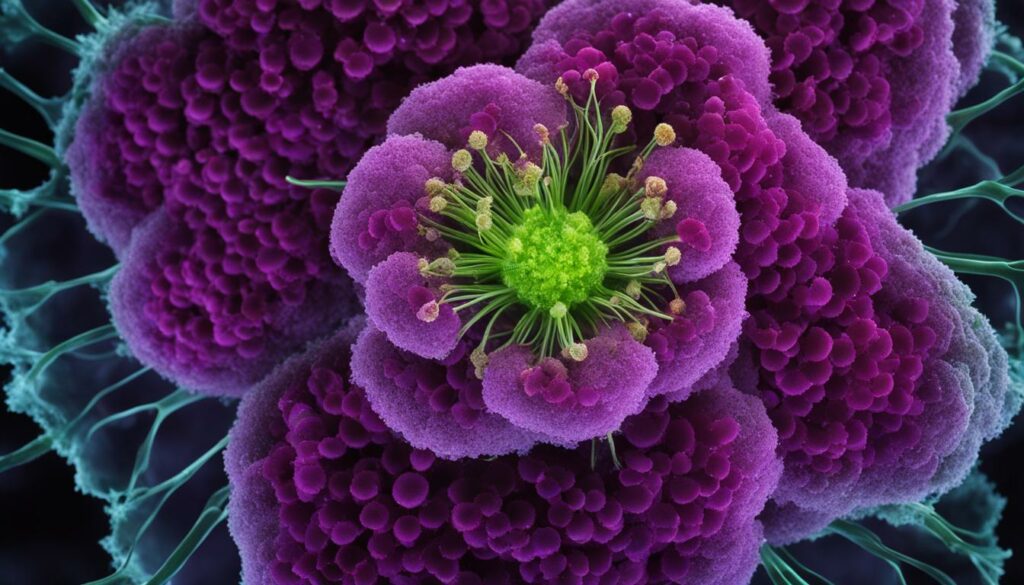Did you know that sulforaphane, a compound found naturally in cruciferous vegetables like broccoli, kale, and Brussels sprouts, holds incredible health benefits?
This powerful compound has been gaining attention for its antioxidant properties, which help protect against free radicals and reduce the risk of chronic diseases. But its benefits don’t stop there.
Sulforaphane also offers anti-inflammatory effects, supports cancer prevention and treatment, provides neuroprotective benefits, and boosts heart health.
Research has shown that incorporating sulforaphane into your diet can have a significant impact on your overall well-being and may contribute to improved health outcomes. Let’s explore the various ways sulforaphane can unlock a healthier you.
Key Takeaways:
- Sulforaphane, found in cruciferous vegetables, offers impressive health benefits.
- It acts as a powerful antioxidant, protecting against free radicals and reducing the risk of chronic diseases.
- Sulforaphane has anti-inflammatory effects and can support a healthy inflammatory response in the body.
- It possesses cancer prevention and treatment capabilities by influencing gene expression.
- Incorporating sulforaphane-rich foods and supplements can help you harness its full potential for improved health.
The Antioxidant Power of Sulforaphane
Sulforaphane, a compound found in cruciferous vegetables like broccoli, kale, and Brussels sprouts, possesses potent antioxidant effects that can benefit your health.
As an antioxidant, sulforaphane plays a crucial role in neutralizing harmful free radicals in the body, protecting cells from oxidative damage and reducing the risk of chronic diseases related to oxidative stress.
To understand the antioxidant power of sulforaphane, it’s important to recognize its mechanisms of action. Sulforaphane activates enzymes that directly combat free radicals, enhancing the body’s natural defense system against oxidative stress.
This compound also supports the production of glutathione, a powerful antioxidant present in every cell, further increasing cellular protection.
By incorporating sulforaphane-rich foods into your diet, such as broccoli, kale, and Brussels sprouts, you can maximize the antioxidant benefits of this compound. These cruciferous vegetables are not only delicious but also convenient sources of sulforaphane.
To further enhance your sulforaphane intake, you may also consider sulforaphane supplements that contain broccoli seed extract, providing a concentrated dose of this beneficial compound.
By harnessing the antioxidant power of sulforaphane, you can strengthen your body’s defenses against oxidative stress and promote overall health and well-being.
The Benefits of Sulforaphane Foods
Sulforaphane-rich foods, particularly cruciferous vegetables, offer a wide range of health benefits beyond their antioxidant effects. These foods are packed with essential nutrients, including vitamins, minerals, and fiber, that contribute to overall wellness.
Additionally, research suggests that sulforaphane may have anti-cancer, anti-inflammatory, and neuroprotective effects, making it a valuable addition to a balanced diet.
“Sulforaphane-rich foods like broccoli, kale, and Brussels sprouts provide a natural and bioavailable source of sulforaphane, offering a convenient way to incorporate this beneficial compound into your daily meals.”
Sulforaphane Extract: A Concentrated Source of Antioxidants
If you prefer a more concentrated dose of sulforaphane, dietary supplements containing broccoli seed extract can be an effective option. These supplements offer a convenient way to boost your sulforaphane intake and experience its antioxidant effects.
When selecting sulforaphane supplements, it’s important to choose high-quality products from reputable brands to ensure purity and potency. Consult with a healthcare professional to determine the appropriate dosage and suitability for your individual needs.
Integrating sulforaphane-rich foods and supplements into your diet can optimize your antioxidant intake and support your overall health. By leveraging the power of sulforaphane, you can enhance your well-being and contribute to a healthier lifestyle.
Anti-Inflammatory Effects of Sulforaphane
Chronic inflammation is a major underlying factor in many health issues, including arthritis and heart disease. Sulforaphane, a powerful compound found in cruciferous vegetables, offers anti-inflammatory properties that can help reduce chronic inflammation in the body.
By suppressing the activation of inflammatory pathways, sulforaphane helps alleviate symptoms such as pain and swelling. This makes it particularly beneficial for individuals with autoimmune conditions, where inflammation plays a significant role in their health challenges.
To harness the anti-inflammatory effects of sulforaphane, it’s important to incorporate foods that are rich in this beneficial compound.
Broccoli and Brussels sprouts are excellent sources of sulforaphane, making them ideal additions to your diet. Additionally, sulforaphane supplements, derived from broccoli seed extract, can be an effective way to enhance your inflammatory response and support overall well-being.
Key Benefits of Sulforaphane for Inflammation:
- Pain and Swelling Relief: Sulforaphane helps alleviate symptoms associated with chronic inflammation, offering relief from pain and swelling.
- Support for Autoimmune Conditions: Individuals with autoimmune conditions can benefit from sulforaphane’s ability to regulate inflammatory responses in the body.
“Sulforaphane has shown promising results in reducing chronic inflammation and providing relief for individuals battling autoimmune conditions.” – Dr. Emily Sullivan, MD
By including sulforaphane-rich foods in your diet and considering sulforaphane supplements, you can take advantage of the anti-inflammatory effects of this powerful compound and promote a healthy inflammatory response in your body.

References:
- Bilski, J., Mazur, M., & Wojcik-Karczewska, M. (2020). Sulforaphane as a potential protective factor against diseases caused by oxidative stress. Biomolecules, 10(6), 904.
- Talalay, P., & Fahey, J. W. (2001). Phytochemicals from cruciferous plants protect against cancer by modulating carcinogen metabolism. Journal of Nutrition, 131(11 Suppl), 3027S-3033S.
- Wu, L., Yuan, Q., & Liu, S. (2020). Sulforaphane: A promising radioprotective agent. Food & Function, 11(10), 8524-8536.
Sulforaphane and Cancer Prevention
Sulforaphane, a key compound found in cruciferous vegetables, has shown promising potential in cancer prevention and treatment.
Studies have revealed that sulforaphane possesses the remarkable ability to detoxify carcinogens and influence gene expression. It activates genes that fight against cancer while inhibiting those that promote tumor growth.
Research has focused on various types of cancer, including breast, prostate, and colon cancer, highlighting the effectiveness of sulforaphane in inhibiting cancer cell growth and supporting the body’s natural cancer-fighting abilities.
While the optimal dosage of sulforaphane may vary based on individual needs, incorporating this powerful compound into your diet through cruciferous vegetables and supplements can be a valuable strategy for cancer prevention and overall well-being.
The Potential of Sulforaphane

“Sulforaphane possesses the remarkable ability to detoxify carcinogens and influence gene expression.”
Research on sulforaphane has focused on its role in preventing and treating cancer. Here are some notable findings:
| Cancer Type | Research Findings |
|---|---|
| Breast Cancer | A study published in the Journal of Nutrition demonstrated that sulforaphane inhibits the growth of breast cancer cells and reduces the risk of breast cancer development. |
| Prostate Cancer | Research conducted at the University of California, Berkeley, showed that sulforaphane can suppress the growth of prostate cancer cells and potentially prevent the development of aggressive forms of the disease. |
| Colon Cancer | A study published in the Cancer Prevention Research journal found that sulforaphane inhibits the growth of colon cancer cells and has potential as a preventive and therapeutic agent for this type of cancer. |
It’s important to consult with a healthcare professional to determine the appropriate sulforaphane dosage based on individual needs and health conditions. By incorporating sulforaphane into your diet and supplement routine, you can potentially reduce the risk of cancer and support your body’s natural defenses against this devastating disease.
Conclusion
Sulforaphane, found in cruciferous vegetables like broccoli, kale, and Brussels sprouts, offers a wide range of health benefits. Extensive research has revealed its antioxidant properties, anti-inflammatory effects, and its potential in cancer prevention and treatment.
By incorporating sulforaphane-rich foods into your diet, such as broccoli, kale, and Brussels sprouts, and considering supplements containing broccoli seed extract, you can unlock the full potential of sulforaphane for your health.
By harnessing the benefits of sulforaphane, you can enhance your overall well-being and contribute to a healthier lifestyle. Its antioxidant properties help protect against free radicals and reduce the risk of chronic diseases related to oxidative stress.
Additionally, sulforaphane’s anti-inflammatory effects support a healthy inflammatory response in the body, and its potential in cancer prevention has shown promising results in various types of cancer.
Explore the power of sulforaphane by incorporating sulforaphane-rich foods and supplements into your daily routine. Whether you enjoy a delicious broccoli salad or take a sulforaphane extract, this potent compound can significantly impact your health.
By staying consistent with sulforaphane consumption, you can reap the numerous health benefits and improve your overall well-being.
FAQ
What is sulforaphane?
Sulforaphane is a compound found naturally in cruciferous vegetables like broccoli, kale, and Brussels sprouts.
What are the health benefits of sulforaphane?
Sulforaphane offers antioxidant and anti-inflammatory effects, supports cancer prevention and treatment, provides neuroprotective benefits, and boosts heart health.
Where can I find sulforaphane?
Sulforaphane can be found in cruciferous vegetables such as broccoli, kale, and Brussels sprouts, as well as in supplements that contain broccoli seed extract.
How does sulforaphane act as an antioxidant?
Sulforaphane activates enzymes that directly combat free radicals, helping to neutralize harmful substances in the body. It also enhances the body’s own antioxidant defenses, providing long-term cellular protection against damage and reducing the risk of chronic diseases related to oxidative stress.
What are the anti-inflammatory effects of sulforaphane?
Sulforaphane has anti-inflammatory properties and helps reduce chronic inflammation in the body by suppressing the activation of inflammatory pathways. It can alleviate symptoms such as pain and swelling, making it particularly beneficial for individuals with autoimmune conditions.
How does sulforaphane support cancer prevention?
Sulforaphane has the ability to detoxify carcinogens and influence gene expression, turning on genes that fight against cancer and turning off those that promote tumor growth. Research has shown its effectiveness in inhibiting cancer cell growth, making it a valuable strategy for cancer prevention.




